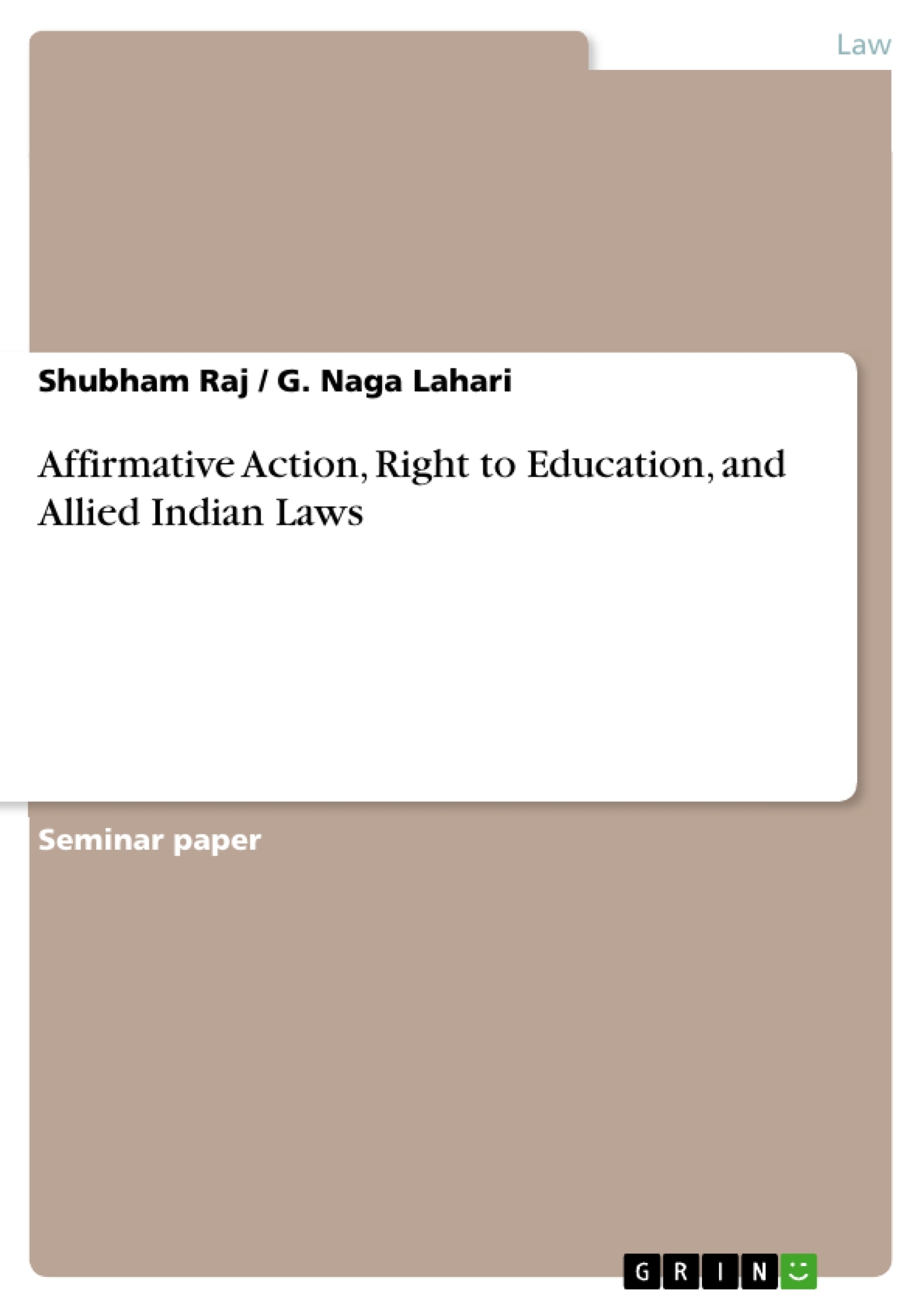Whenever the term “Affirmative action” is used, it is understood that what is being referred to is ‘positive discrimination’ or ‘reservation’, in simplest of the meanings. If one goes by its general meaning, it would mean any act done in furtherance of “fair treatment”. And with the present large awakening era our country is going through, it is time for the meaning of affirmative action to be widened and not be confined only to ‘reservation’. Affirmative action is every step taken, every action done and every statute enacted enabling every underprivileged, prejudiced, deprived person belonging to a minority group or the like, to stand equally. And, especially in case of affirmative action in education, not only shall these actions fall under the definition of ‘affirmative action’ but should also include the duties and roles of the students, parents, teachers and of society as a whole discharged in order to achieve “education for all”, as aimed for by the UNESCO. It is affirmative action when the poor family sends its ward to the nearest school for education instead of forcing him/her to get engaged with the family business. It is affirmative action when a child struggles with his parents for permission to let him go to the school, it is affirmative action when a teacher finds joy in imparting education to the children and the society encourages the school going children and the education.
Inhaltsverzeichnis (Table of Contents)
- INTRODUCTION
- EDUCATION AS A RIGHT
- AFFIRMATIVE ACTION IN EDUCATION
- Education of Children with Disabilities
- Education of People (Children) Belonging to Minority Groups
- CONCLUSION
Zielsetzung und Themenschwerpunkte (Objectives and Key Themes)
This article explores the concepts of affirmative action and the right to education within the Indian legal framework, aiming to understand how these principles promote social justice and equitable access to educational opportunities.
- Affirmative Action in Education
- The Right to Education as a Fundamental Right
- The Role of the State in Promoting Educational Equality
- Historical Context of Affirmative Action in India
- The Impact of Affirmative Action on Social Justice
Zusammenfassung der Kapitel (Chapter Summaries)
- INTRODUCTION: This section defines the concept of affirmative action and clarifies its significance in the context of social justice and equitable access to education. It emphasizes the importance of affirmative action in empowering underprivileged groups and promoting inclusivity in education.
- EDUCATION AS A RIGHT: This chapter establishes the right to education as a fundamental human right and outlines its crucial role in individual and societal development. It highlights the importance of education for promoting human dignity, fostering a democratic society, and empowering citizens.
- AFFIRMATIVE ACTION IN EDUCATION: This section delves into the historical context of affirmative action in education in India, tracing its origins to anti-Brahman movements in the late 19th and early 20th centuries. It discusses the constitutional provisions and legal frameworks that have shaped affirmative action policies in education.
Schlüsselwörter (Keywords)
This article focuses on the key concepts of affirmative action, the right to education, social justice, educational equality, and the role of the state in promoting inclusive education. The article analyzes the impact of affirmative action policies on marginalized communities in India, particularly focusing on the constitutional and legal frameworks that govern these policies.
Frequently Asked Questions
What is "Affirmative Action" in the Indian legal context?
Affirmative action in India refers to policies like reservations and positive discrimination aimed at empowering underprivileged and marginalized groups.
Is the Right to Education a fundamental right in India?
Yes, the Indian Constitution recognizes education as a fundamental right, ensuring that every child has access to quality schooling regardless of their background.
How does affirmative action promote social justice?
By providing equitable access to education and jobs, it enables deprived persons to stand equally in society and overcomes historical prejudices.
Does affirmative action only mean reservation?
No, it includes every step taken by the state, society, and parents to achieve "education for all," such as supporting children with disabilities or minority groups.
What is the role of the state in educational equality?
The state is responsible for enacting statutes and providing infrastructure that enable underprivileged groups to access educational opportunities.
How did affirmative action start in India?
Its origins can be traced back to anti-Brahman movements in the late 19th and early 20th centuries, which sought to challenge social hierarchies.
- Arbeit zitieren
- Shubham Raj (Autor:in), G. Naga Lahari (Autor:in), 2016, Affirmative Action, Right to Education, and Allied Indian Laws, München, GRIN Verlag, https://www.hausarbeiten.de/document/375935


